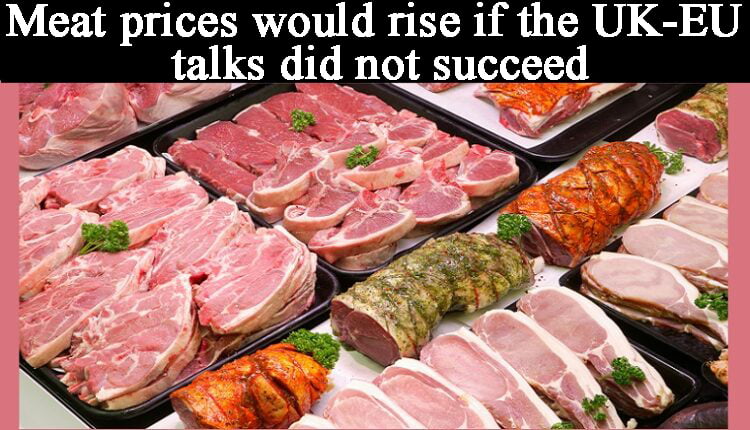Meat prices would rise if the UK-EU talks did not succeed; retailers and exporters will be in trouble after Brexit
DUBLIN: Indications are that meat prices will rise sharply if the UK-Ireland talks on post-Brexit trade are disrupted. Ireland is a major exporter of meat items. Most of these are going outside the European Union. At the same time, Ireland uses mostly meat from the UK and other European countries for sale in the local market. After Brexit, like many other food items, meat will have to pay more, mainly because it depends on the UK market.
Meanwhile, final talks are underway to ease the trade ban on meat products. It is reported that the UK is planning some restrictions on the same model as the EU. This will put pressure on the entire European Union.
Britain plans to impose restrictions or bans on businesses from Ireland to the UK, just as EU restrictions apply to trade in Northern Ireland. In that case, the island of Ireland would be under even greater pressure and crisis.
Under EU law, there are restrictions on certain meat products outside the European Union. Therefore, if no agreement is reached on the post-Brexit trade, a wide range of foods, including sausages, mince and prepared meals from Great Britain to the island of Ireland will be banned. In order to avoid this, discussions are underway between the European Union and UK officials.
EU food safety rules will apply to Northern Ireland from January 1, when Brexit begins. At the same time, the UK is hinting that mutual restrictions will apply to such foods coming from Ireland.
The UK says it will continue to repeat EU food safety regulations, including EU restrictions on certain meat products. This will ensure that the trade in sausages and certain meats from Great Britain to Northern Ireland is not banned. The UK has said it will try to find a solution through joint negotiations.
Industry sources with warning
Meanwhile, industry sources warn that if the talks do not succeed, the trade in meat between the two countries could be very detrimental. According to EU food safety laws, the EU will not allow fresh or chilled meat products from outside. The list of banned foods includes chilled minced beef, minced pork or sausages and also poultry that is either frozen or chilled.
Any fresh meat products, including minced meat and meat preparations, which source meat from the EU – and then export to Great Britain where they are cut or minced and re-exported to Northern Ireland – would also be banned.
There is also a provision that only the country where the animals are slaughtered can certify the health of the animals. There are further restrictions on chilled, unprocessed and uncooked sausages. Export Health Certificate is mandatory for any meat products entering the European Union. This is to be signed by a designated veterinary official in the exporting country. Such certificates are not available for non-frozen meat products. Other products will be completely banned.
Industry sources say broader restrictions could extend to a range of foods including seed potatoes, seeds, breaded poultry, sausages, fresh mince, pork stuffing, marinated meat, barbeque products, meatballs, turkey meatballs, lamb mince, kebabs and flour with fortified additives.
European Union’s view
EU officials say the ban on food imports will remain in place even if a third country is listed as a safe country from which to import food. They insist that the European Union has a responsibility to protect consumers.
Not enough clarity has emerged, says Board Bia
Tara McCarthy, CEO of Board Bia, said it is not yet clear what the ban might affect. Irish food companies cannot control what is happening in Brussels. The Board therefore advises Irish producers to look at their preparation and engagement with customers, as well as diversification. She said 37% of Irish food exports – worth €4.5bn annually – goes to the UK.
According to UK:
The UK says it will implement its own food safety and animal health regime from 1 April, 2021. London has indicated that from that moment it will effectively copy the EU’s food safety rulebook, including the use of export health certificates modelled on EU certificates.
UK has agreed that it will maintain EU food safety and animal health rules from 1 January. If London decides to deviate from any of those rules, the EU could alert the WTO and initiate a consultation period. According to UK sources, such a period could last from six to nine months.
Ireland and UK trade
The UK has not yet published their health certificate. The Irish Department of Agriculture said: “Whilst the UK have not yet published their import health certificates, they have said that they intend on using EU import certificates as the basis of the certificates they will use for EU exports to Great Britain.”
Copying the EU rulebook means that the EU’s restrictions and ban on Northern Ireland will also apply to Irish meat producers entering Great Britain. Trade sources said that Irish vets will have to sign a large number of export health certificates for Irish meat goods going to the UK from April 1.
In 2018, Ireland exported 335,000 tonnes of beef, pig, sheep and poultry meat worth €1.3 billion to the UK, according to the Central Statistics Office (CSO). Brexit will take effect on January 1. The problem will be one of a number of challenges that retailers in the North and South will have to face since then.


Comments are closed.